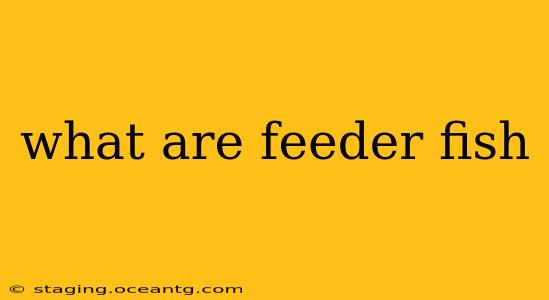What Are Feeder Fish?
Feeder fish are small, live fish used as food for larger predatory fish, amphibians, reptiles, or other aquatic animals kept in captivity. They are a common, albeit controversial, part of the pet trade and aquaculture. Think of them as the "fast food" of the aquatic world. Understanding what constitutes a feeder fish, their ethical implications, and alternatives is crucial for responsible pet ownership.
What types of fish are commonly used as feeder fish?
Several small fish species are frequently used as feeder fish. These include:
- Minnows: Various minnow species are widely available and relatively inexpensive, making them a popular choice.
- Goldfish: While seemingly harmless, using goldfish as feeder fish is ethically questionable due to their potential for longer lifespans and sentience compared to some other options.
- Guppies: These colorful, prolific breeders are sometimes used, but their relatively high cost compared to minnows often makes them less appealing.
- White Cloud Mountain Minnows: These hardy fish are sometimes used, but they're becoming less common as awareness of their sentience grows.
The specific species used can vary depending on the size and needs of the predator animal. Larger predators will require larger feeder fish.
Are feeder fish cruel? Is it ethical to use them?
This is a highly debated topic amongst pet owners and animal welfare advocates. The ethical concerns surrounding the use of feeder fish stem from several factors:
- Short lifespans and often poor living conditions: Feeder fish are frequently kept in crowded, unsanitary conditions, leading to stress, disease, and early death, even before they become prey.
- Sentience and capacity for suffering: While the level of sentience varies between species, many believe that even small fish experience pain, fear, and stress, making their use as food morally problematic.
- Unnecessary suffering: The process of catching, transporting, and handling feeder fish can be stressful and inhumane.
Many aquarium hobbyists are actively seeking alternatives to feeder fish, focusing on ethically sourced, frozen or freeze-dried foods.
What are the alternatives to using feeder fish?
Fortunately, numerous alternatives are available to provide essential nutrition for captive predators without relying on live fish:
- Frozen food: This includes a variety of options, such as bloodworms, brine shrimp, mysis shrimp, and various fish fillets. Frozen foods are convenient, readily available, and often more nutritious than live feeder fish.
- Freeze-dried food: Similar to frozen food, but with a longer shelf life.
- High-quality commercial pellets and flakes: Many formulated diets are specifically designed to meet the nutritional needs of predatory fish and other aquatic animals.
- Insects: Some larger aquatic animals, like certain amphibians, can be fed insects like crickets or mealworms.
Are there any health risks associated with using feeder fish?
Yes, there are potential health risks associated with using live feeder fish:
- Disease transmission: Feeder fish can carry parasites and diseases that can infect the predator animal.
- Nutritional deficiencies: Feeder fish may not provide a complete and balanced diet for the predator, leading to nutritional deficiencies.
How should feeder fish be stored and handled?
If you do choose to use feeder fish, proper storage and handling are critical to minimize stress and the risk of disease:
- Keep them in a clean, well-oxygenated container: Avoid overcrowding.
- Handle them gently: Avoid injuring the fish.
- Use only healthy-looking fish: Discard any fish that appear sick or injured.
- Quarantine feeder fish before feeding them to your predator: This helps prevent the spread of disease.
However, remember that even with careful handling, the ethical concerns remain. Exploring and adopting ethical alternatives should always be prioritized.
Choosing to use or avoid feeder fish is a personal decision with significant ethical considerations. Understanding the various alternatives and the potential risks and benefits will help you make an informed choice that is both responsible and beneficial for the well-being of your animals.
